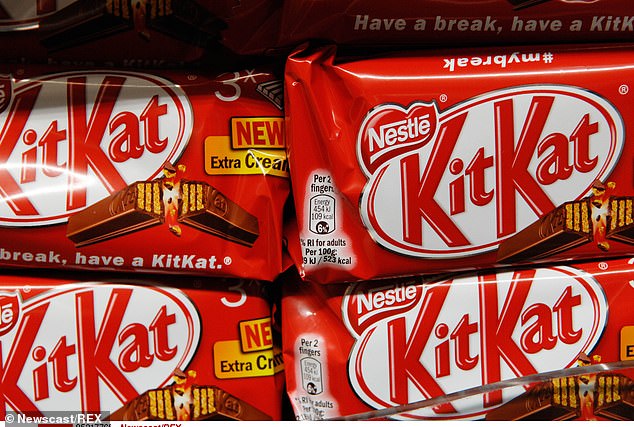Will Ozempic change junk food forever? Nestle developing ‘companion products’ for weight loss drugs – amid fears consumers will lose their appetite for sweets
If you’re trying to lose weight, you’re unlikely to reach for a Kit-Kat.
But chocolate bar maker Nestle has started working on new products for people who may be taking weight-loss drugs, to ensure it doesn’t suffer if people cut back on calories and stop buying sweets.
The Swiss food giant’s CEO Mark Schneider said that Nestle has so far not seen any impact from weight-loss drugs such as Wegovy and OZempic on the company’s sales, addressing the threat the drugs pose to the junk food industry, which is driving investors has been frightening in recent weeks.
Shares of Nestle fell this month after Walmart, the world’s largest retailer, said it saw a drop in food consumption thanks to people taking appetite suppressant drugs.

Kit-Kat maker Nestle has started working on a new range of products for people who may be taking weight-loss drugs to ensure the company doesn’t lose out when people start cutting calories
“We are already working on a wide range of products that can serve as companion products,” Schneider said during an earnings briefing.
He told Bloomberg: ‘If you eat less, you have certain needs for vitamins, minerals and supplements. You want to be sure that the weight loss is supported. You want to make sure you limit the loss of lean muscle mass.”
“The largest parts of our portfolio will not be affected” by this new class of weight-loss drugs, he said.
Globally, Nestlé’s largest businesses are coffee and pet care, while frozen foods, confectionery and ice cream account for 15 percent of sales.
“We are monitoring this closely and will keep you informed,” Schneider said.
Originally intended for the treatment of diabetes but since its approval for weight loss, Wegovy has been shown to help patients reduce body weight by approximately 15 percent when used in combination with exercise and lifestyle changes.
It is available in the United States, Norway, Denmark and Germany – all countries where Nestle sells its products.
In the last three months of 2022, healthcare providers wrote more than nine million prescriptions for appetite suppressant medications.
This figure has likely skyrocketed since demand for drugs like Ozempic, approved only for diabetes but prescribed off-label for weight loss, and Wegovy grew this year.
Recent analyzes show that as many as 15 percent of Americans – about 150 million people – have now tried the drugs.
Amid this rapidly rising trend, which shows no signs of stopping, retailers have already noticed a clear impact on the number of groceries and orders placed in restaurants.
Thomas Makkos, the owner of Nello on Madison Avenue, New York, previously told the New York Post that the restaurant is now offering tapas-sized portions and smaller versions of popular meals like the Gnocchi Mona Lisa. The standard version of this meal costs $51, while a newly created, more modest version costs $39.
Several other Upper East Side restaurants are evolving in similar ways.
Sammy Muscovic, owner of Sojourn and Sojourn Social nearby, said the branches have started serving smaller versions of flagship meals, including burgers without fries and three egg rolls for $8 instead of $12 for five.
Major banks, such as Morgan Stanley, predict that by 2035, 24 million people, or seven percent of the US population, will use weight-loss drugs.
An analysis by the bank also predicts that patients prescribed the drugs will consume a quarter of the sweets, confectionery and other junk food they used to eat – saving billions of dollars in annual revenue.
And companies are already afraid. A recent analysis shows that executives at junk food companies are increasingly talking to investors about the drugs.
Morgan Stanley’s food analyst Pamela Kaufman said in a report: “The food, beverage and restaurant industries could see weaker demand, especially for unhealthier foods and high-fat, sweet and salty options.”
The new class of drugs could lead to a 20 to 30 percent reduction in daily calories, and people tend to eat fewer foods high in sugar and fat, meaning the makers of chips, cookies and pastries could take a hit , where the banks A decline in consumption is predicted by as much as three percent until 2035.
Ozempic and Wegovy are brand names for the drug semaglutide, which suppresses appetite and causes weight loss.
It is a once-a-week injection and requires a prescription from the doctor.
The drugs bind to the GLP-1 receptor, a protein that activates hormones in the brain that keep the stomach full and tell the body to stop eating and avoid cravings.
This year, doctors have already given out more than 800,000 prescriptions for Ozempic’s sister drug Wegovy.
However, the use of the weight loss medications comes with side effects, including XXX
